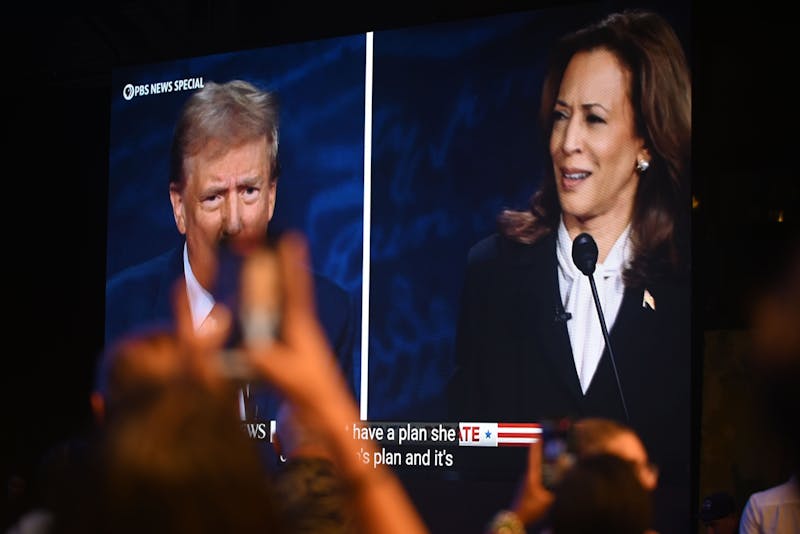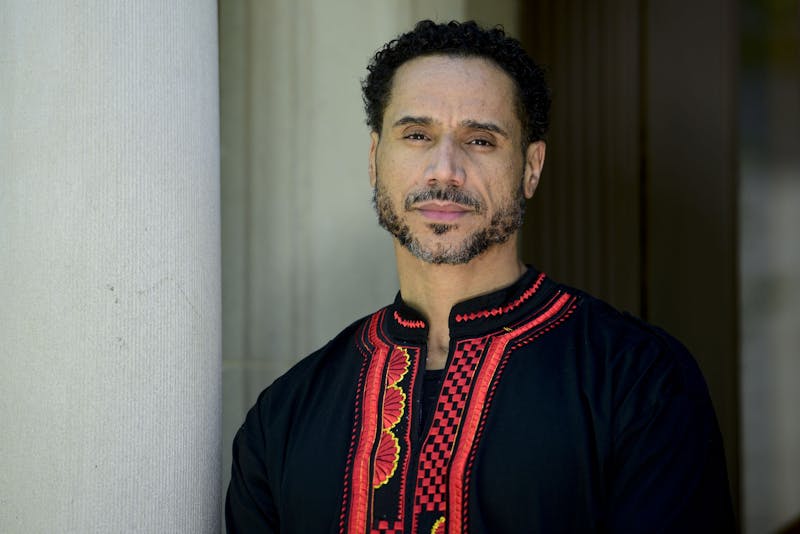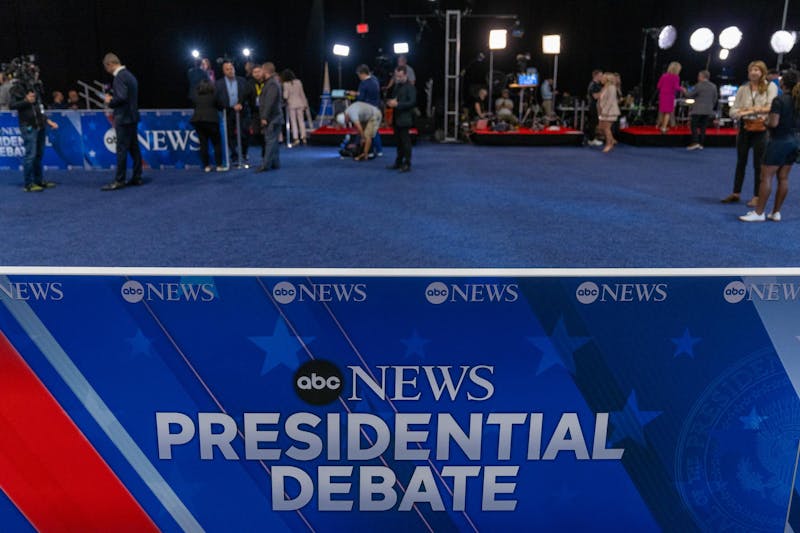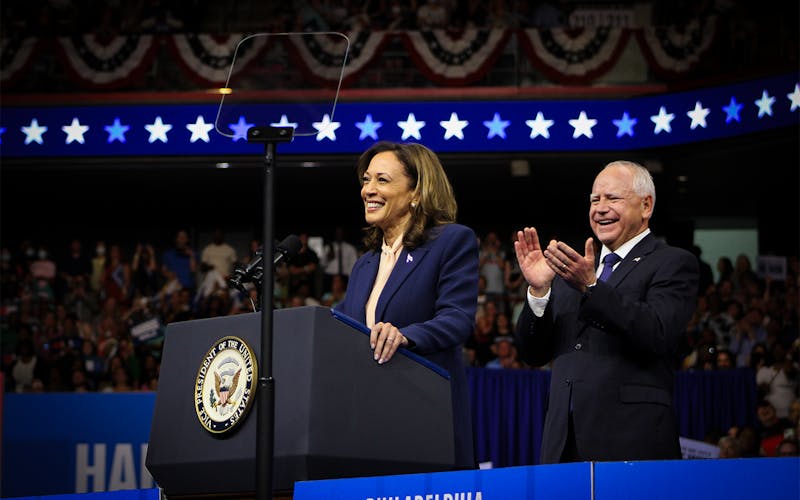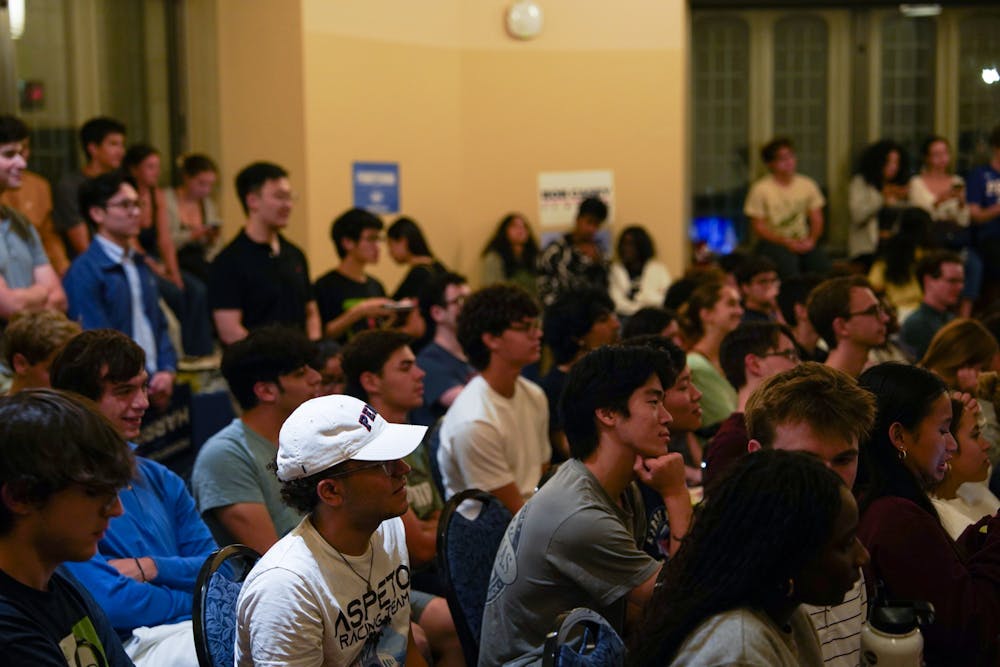
Penn students gathered across campus on Tuesday night to watch the high-stakes presidential debate between Vice President Kamala Harris and 1968 Wharton graduate and former President Donald Trump — held only a few miles away downtown in Philadelphia.
Debate watch parties were organized everywhere from rooftop lounges in high rise dorms and academic buildings to Smokey Joe’s, all of which saw students eager to discuss and react to the debate's biggest moments. While many students pointed to the face-off as successful in illuminating the differences between the two candidates, some lamented the muting of microphones as inhibiting "fiery" discussion — and others said that, either way, the event made for a fun drinking game.
Penn Democrats and Penn College Republicans each hosted debate watch parties in Irvine Auditorium and Huntsman Hall, respectively. Penn Dems’ leaders, including College juniors Ellie Goluboff-Schragger and Veronica Smith, said that Harris had met their expectations of showing strength and an ability to point out Trump's lies.
During the debate's first commercial break, students broke into animated conversation. Throughout the event, internet issues caused buffering and delays, but attendees said that the problems did not impact their viewing experience.
On the other side of campus, College Republicans watched from Huntsman Hall. The group called the debate a "significant moment in this election cycle" in a statement to The Daily Pennsylvanian.
“While we believe Donald Trump has had stronger performances in the past, he remained a formidable presence on the stage,” the statement read.
College senior Charles King, who attended the Penn Dems watch party, told the DP that coming into the debate, he had hoped to see conversations surrounding foreign and economic policy from each candidate, and thought Harris was more successful in that regard.
College Republicans praised both candidates’ “resilience and tenacity” during the debate, but noted that both made mistakes, adding that they were “disappointed by the spread of inaccurate information.” They described the Harris’ agenda as “unclear and inconsistent.”
“As the race continues, it is imperative that voters stay informed, challenge misinformation, and consider the direction they want for the future of our nation,” they wrote.
King said he thought the biggest impact of the debate would be on the “fence sitters” — voters who have not committed to voting for either candidate in November.
Several on-campus dorms also hosted watch parties, including Lauder College House and Rodin College House. Students in Lauder reacted enthusiastically to the debate, with Harris' point that Trump has previously been found criminally liable being met with the night's loudest applause.
Despite the high energy, expectations among some students were low.
College first year Hendrix Lee expected the debate to focus not on substance but on "things [that] honestly just don't matter."
Rachel Baker, a Lauder College House Fellow, said that the turnout at the watch party had exceeded her expectations. Chairs had been brought in from throughout the building, and there was only standing room left in the debate watching area.
In Rodin — where a projector malfunction briefly interrupted the watch party — students began laughing after Trump prevented Harris from interrupting him, mocking her performance at the 2020 vice presidential debate where she told former Vice President Mike Pence “I’m speaking.”
Rodin residential advisors said that over 60 students attended the event, exceeding expectations for turnout.
Wharton sophomore Allison Mianni, who attended the Rodin party, said it was reasurring to watch the debate alongside others who cared about politics and the election's outcome.
Engineering senior Spencer Ware and Wharton senior Grant Mao watched the debate together at Smokes’, a campus institution. Both compared Tuesday night's matchup to those between Trump and Biden, with Mao lamenting candidates' inability to interrupt one another and Ware adding that he was very surprised "with how pro-Israel Kamala came out.”
“It’s been fun to just make a drinking game out of it,” he said.
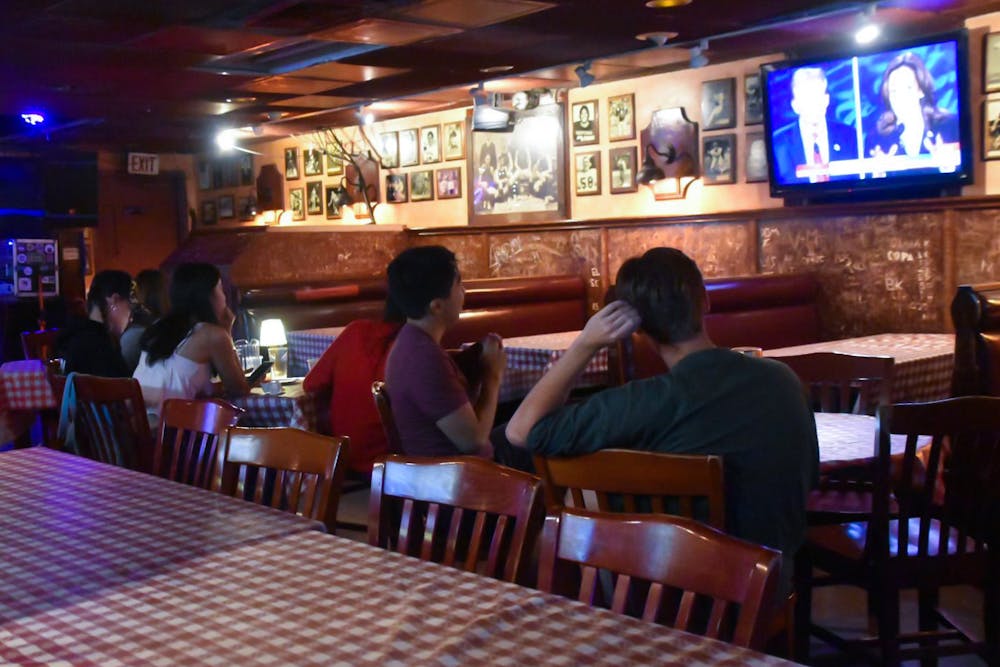
Students also gathered on the lower floor of the Annenberg School for Communication, where the school set up a watch party complete with refreshments and a chocolate fountain. Entrance to the building was limited to the doors off of Walnut Street, and security checked students’ Penn IDs before allowing them to enter the building.
College juniors Skye Paulus and Olivia Silvestri said the debate had successfully illuminated the differences between the candidates and applauded the two moderators, ABC News’ David Muir and Linsey Davis.
Litty Paxton, Annenberg's associate dean of undergraduate studies, said the watch party — which drew nearly 200 attendees — was a collaborative effort. She said its success would prompt Annenberg to consider similar events for another presidential debate if one should occur, and for election night.
Another administrator in attendance, Annenberg Public Policy Center Director and Communication professor Kathleen Hall Jamieson, said that if the debate helped American voters “get information it couldn’t otherwise get … then the American people won the debate.”
Jamieson, who works with FactCheck.org and is a renowned scholar of presidential debates, is teaching a class this fall where students were assigned to one of four rooms streaming coverage from either ABC, CNN, FOX, or NBC to assess how different networks framed the debate, advertised during it, and approached their commentary of it.
Although she felt that the debate was moderated well, Jamieson questioned why Muir and Davis did not hold Trump more tightly to the muted microphone rule, which she noted differentiated the debate from previous ones, along with the absence of an audience.
The Daily Pennsylvanian is an independent, student-run newspaper. Please consider making a donation to support the coverage that shapes the University. Your generosity ensures a future of strong journalism at Penn.
Donate








